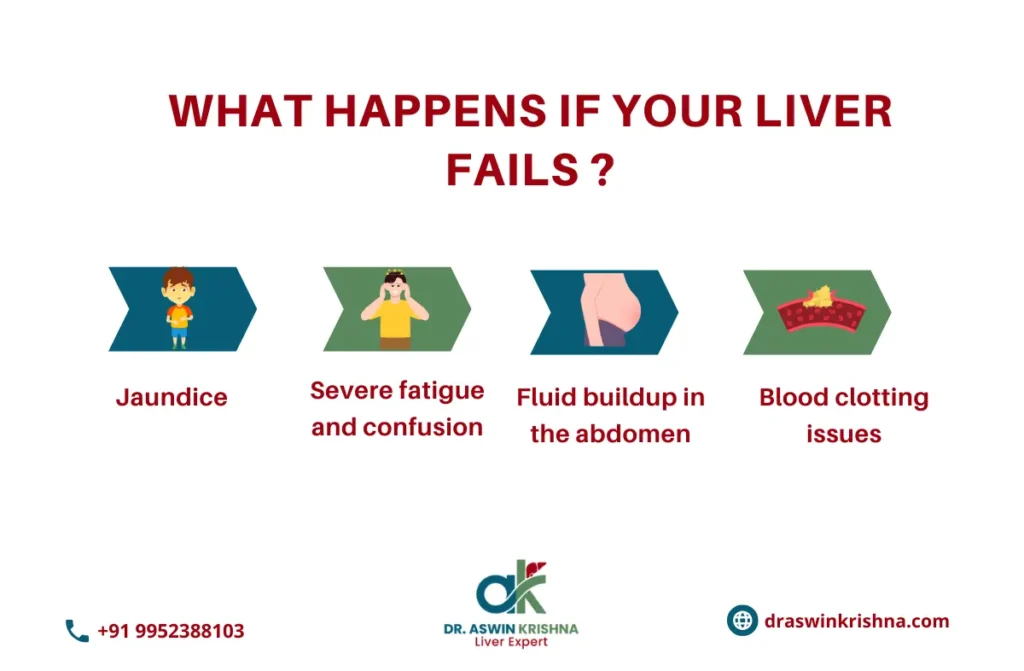The liver is one of the most critical organs in the human body, performing over 500 vital functions that keep us alive and healthy. From detoxifying the blood to supporting digestion, the liver works tirelessly every day. But what happens if it stops working? Can you live without your liver? The simple answer is no. Without it, survival becomes impossible unless immediate medical intervention, such as a liver transplant, is provided. As Dr. Aswin Krishna, a leading specialist in liver health, I often emphasize the importance of this organ in maintaining overall well-being. While modern medicine has made remarkable advancements in managing liver failure, understanding its functions and recognizing the symptoms of liver disease can be lifesaving.
What is Liver Failure?
Liver failure occurs when your liver becomes severely damaged and can no longer perform its essential functions. This can happen suddenly (acute liver failure) or over time (chronic liver failure).
Key Causes of Liver Failure:
- Viral Infections: Hepatitis B and C are the leading causes.
- Alcohol Abuse: Long-term alcohol consumption can severely damage the liver.
- Fatty Liver Disease: Often linked to obesity, this condition can progress to liver failure.
- Toxins and Medications: Overuse of certain drugs, like acetaminophen, can harm the liver.

Is it Possible to Live Without a Liver?
The simple answer is no. The liver performs more than 500 critical functions, making it one of the most vital organs in the human body. From filtering toxins out of your blood to producing bile for digestion, the liver is indispensable. Can you live without your liver? Without it, survival becomes impossible without medical intervention, such as a liver transplant.
If the liver stops working completely, a person’s life is at immediate risk. This is why liver health is so crucial and why early diagnosis of liver conditions can save lives. Can you live without your liver? The answer remains no, but modern medicine offers ways to manage liver failure effectively.
Stages of Liver Failure
Liver failure progresses through several stages. Understanding these can help in early detection and treatment.
- Inflammation: The liver becomes swollen due to irritation or infection.
- Fibrosis: Scar tissue begins to form, hindering liver function.
- Cirrhosis: Severe scarring reduces liver efficiency, often leading to complications.
- End-Stage Liver Disease (ESLD): The liver can no longer sustain life without medical intervention.
Can You Have Your Liver Removed?
Can you have your liver removed? The answer depends on the context. While the liver cannot be entirely removed, parts of it can be surgically removed if necessary. For instance, during a liver transplant, a portion of the donor’s liver is transplanted into the recipient. Remarkably, the liver can regenerate itself, allowing the remaining portion to grow back to its full size.
Scenarios Where Partial Liver Removal Is Possible:
- Liver tumors or cancers.
- Donating a portion of your liver for transplant.
- Removing damaged sections due to injury or disease.
The liver’s regenerative abilities make it unique among human organs. Even after partial removal, its capacity to heal and grow ensures survival. Can you have your liver removed? Not entirely, but partial removal is possible and often successful.
Can You Survive a Punctured Liver?
The liver’s location in the upper right abdomen makes it vulnerable to trauma. Can you survive a punctured liver? Yes, but the outcome depends on the severity of the injury and the speed of medical intervention. The liver has an excellent blood supply, which is both a blessing and a risk. While this enables regeneration, it also means a punctured liver can lead to significant blood loss.
Symptoms of a Punctured Liver:
- Severe abdominal pain.
- Rapid heartbeat or low blood pressure (signs of blood loss).
- Difficulty breathing.
Treatment Options:
- Emergency surgery to repair the damage.
- Blood transfusions if significant blood loss occurs.
- Monitoring and supportive care in less severe cases.
Prompt medical care is critical to recovery. Can you survive a punctured liver? Yes, with timely intervention.
Can You Live Without Half a Liver?
The liver’s regenerative ability is nothing short of miraculous. Can you live without half a liver? Yes, in most cases, you can. If half of the liver is removed, the remaining portion will grow back to compensate for the loss. This regeneration process typically takes several weeks to months.
When Half a Liver Might Be Removed:
- To treat liver cancer.
- As part of a liver donation.
- To remove damaged tissue from injury or disease.
What to Expect During Recovery:
- Rest and limited physical activity are crucial.
- A healthy diet supports liver regeneration.
- Regular follow-ups to monitor liver function.
This extraordinary capability underscores the liver’s importance and resilience. Can you live without half a liver? Absolutely, thanks to its regenerative powers.
Liver Functions
To truly appreciate the liver’s importance, let’s explore its key functions:
- Detoxification: Filters harmful toxins from the blood.
- Bile Production: Essential for digesting fats and absorbing vitamins.
- Protein Synthesis: Produces proteins needed for blood clotting.
- Energy Storage: Stores glycogen, which is converted into glucose for energy.
- Immune Support: Helps fight infections by removing bacteria from the blood.
The liver’s multitasking ability makes it a cornerstone of human health. Can you live without your liver? Certainly not.
Types of Liver Disease
Liver diseases can vary widely in cause and severity. Common types include:
- Hepatitis: Viral infections causing liver inflammation.
- Cirrhosis: Severe scarring due to long-term liver damage.
- Fatty Liver Disease: Caused by fat buildup in the liver.
- Liver Cancer: Malignant growths that affect liver function.
- Autoimmune Liver Diseases: Conditions where the immune system attacks liver cells.
Each of these conditions can lead to complications if not addressed early. Can you live without half a liver? Many diseases necessitate removing damaged sections, but survival is possible thanks to medical advancements.
Liver Failure Diagnosed
Early diagnosis is vital for effective treatment. Here’s how liver failure is typically diagnosed:
- Blood Tests: Check for liver enzymes, bilirubin levels, and clotting factors.
- Imaging Tests: Ultrasounds, CT scans, or MRIs assess liver damage.
- Liver Biopsy: A small sample of liver tissue is examined for signs of disease.
Accurate diagnosis helps guide treatment decisions and prevent further complications.
Treatment for Liver Failure
Can you live without your liver? since the liver performs over 500 essential functions, including detoxification, protein synthesis, and digestion, life without it is not possible. When liver failure occurs—whether suddenly (acute) or gradually (chronic)—treatment becomes urgent.
For acute liver failure, immediate hospitalization is necessary. Supportive care helps stabilize vital functions and prevent complications like brain swelling. The cause, such as drug toxicity or infection, is treated simultaneously.
Chronic liver failure, often caused by cirrhosis or hepatitis, requires long-term care. Treatment involves:
- Avoiding alcohol and adopting a liver-friendly lifestyle
- Using medications to manage symptoms like fluid retention or bleeding
- Monitoring and treating underlying liver conditions
In advanced stages, liver transplantation is the only life-saving option.
Although you can’t live without your liver, timely intervention, medication, and transplant options offer a path toward recovery and survival.
Conclusion
Can you live without your liver? No, the liver is indispensable for survival. However, medical advancements like liver transplants and supportive care offer hope for those facing liver failure. If you have any concerns about your liver health, I encourage you to reach out for professional advice. As Dr. Aswin Krishna, I’ve seen firsthand how proper diagnosis and timely treatment can transform lives.



